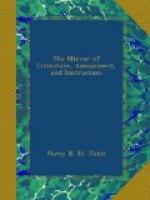North. In every point of view, scrap-books are the death of love. Many a very sensible man can “whisper soft nonsense in a lady’s ear,” when all the circumstances of the scene are congenial. We ourselves have frequently descended to make ourselves merely the most agreeable man in the world, till we unfortunately discovered that the blockheads who could not comprehend us when we were serious, were still farther from understanding the ineffable beauty of our nonsense; so that in both cases we were the sufferers. They took our elegant badinage for our sober and settled opinions, and laughed in the most accommodating manner when we delivered our real and most matured sentiments.
Blackwood’s Magazine.
* * * * *
Notes of a Reader
LORD BYRON’S FIRST LOVE.—NEWSTEAD.
Sir Richard Phillips who has been for some months on a Tour of Inquiry and Observation through the United Kingdom, has just published his First Part, containing Bedfordshire, Northamptonshire, Leicestershire, and part of Nottinghamshire. Sir Richard visited Newstead, and was hospitably entertained by Colonel Wildman. In his “Notes,” on this interesting spot, he says,—“While in this vicinity, I heard many particulars of BYRON’S first love, a passion which tinged the whole of his future life. Near Newstead stands Annesley Hall, a house as considerable and venerable as Newstead itself; and the daughter of the owner, Mr. Chaworth, was an heiress of immense fortune, interesting, and amiable, but about four years older than Byron. He fell in love with her, but she had formed an early attachment for Capt. Musters, of the Nottingham militia, whom she married. After she had some children, she fell into a low state of mind, and separation was the consequence; but, on recovering, she was reunited to her husband, and has since borne him several children. She still lives, but has long been in very infirm health. The affair forms the subject of Lord Byron’s justly celebrated Dream, printed with the ‘Prisoner of Chillon.’
“From the eastern windows of the southern front of Newstead, all the scenery of the poem is visible, except Annesley Hall, which lies over the cape of which he speaks; but there still are trees, and the high point at which he describes the impassioned interview. I read the poem with the objects before me, and was overpowered by the sympathies and recollections which must be familiar to all men, for most men have felt as Byron felt, though few ever portrayed their feelings with such energy of thought and language.
“Night overtaking me at Newstead, the splendid hospitality of Colonel Wildman was kindly exerted, and he indulged a sentimental traveller by allowing me to sleep in Byron’s room and Byron’s bed. Those who admire Byron, (and for those who do not, I care but little) will participate in the luxury of such a night. The bed is elegantly surmounted with baronial coronets, but it was Byron’s and I cared nothing for the coronets, though all the conveniences of the apartment were delightful.




